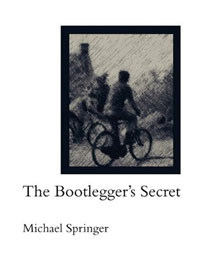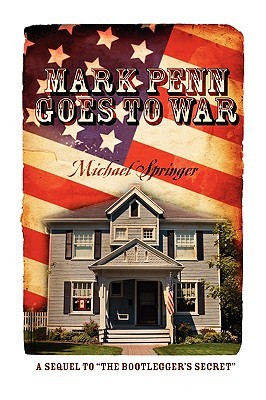Origins
Michael Springer is a Minnesota native, graduate of Minnesota State University, former U.S. Navy line officer, and free-lance writer. He lives with his wife in Gulf Shores, Alabama.
Origin of The Bootlegger's Secret
 When I was a child, I did more listening than talking. When I did talk, it was usually to ask questions.
When I was a child, I did more listening than talking. When I did talk, it was usually to ask questions.
One day I overheard the word "bootlegger." It wasn't part of my vocabulary and intrigued me immediately.
I asked my mother. She told me a story about a local hoodlum who'd controlled the illegal whiskey business in our area. That was many years ago during Prohibition, when the production, sale, and consumption of alcohol was against the law.
One of the most famous criminals during Prohibition was Al "Scarface" Capone of Chicago. It was rumored that our local bootlegger was a low-level, distant member of Capone's gang.
When I asked my mother where this bootlegger was now, she said he'd disappeared about the time Prohibition ended in 1933. He was never heard of again.
I always wondered what happened to that bootlegger.
That's how The Bootlegger's Secret was born.
Origin of MARK PENN GOES TO WAR
 This novel germinated over many years from a single incident when I was a child. It was three months after the Japanese attack on the U.S Navy Base at Pearl Harbor—which ignited America's full participation in World War II.
This novel germinated over many years from a single incident when I was a child. It was three months after the Japanese attack on the U.S Navy Base at Pearl Harbor—which ignited America's full participation in World War II.
By then most of the 100,000 Japanese-Americans in this country had been imprisoned by presidential order. The U.S was also at war with Germany and Italy, but few of these nationals had been detained.
My family lived halfway up what became the Middleton Ridge in my novels. One day I saw a girl about my age walk out of the heavily wooded ravine that cut from the top of the ridge down to the Minnesota River. She was dressed for school, hugging her books, and staring at the ground.
As the girl got closer, I was surprised to find that she looked like photos of Japanese girls in THE WORLD BOOK ENCYCLOPEDIA, a favorite place to browse at home.
I said hello. She passed me by without looking up or saying a word.
Like most kids during the war, I had spies on the brain, and told my parents about her. They said she belonged to a Japanese-American farm family who lived on top of the ridge. They were U.S. citizens. Yes, I thought, but what else might they be?
I never saw the girl again, never saw any of her family, even though I checked out the farm several times while gathering milkweed down for life jackets to help the war effort.
After college, while in the Navy, I was stationed in Japan, and came to know the people and their customs. I used some of those experiences in the writing of MARK PENN GOES TO WAR, but the main character--Ann Matsui--was based on a girl I only saw for a few moments many years before.
>>Read the lost chapter from MARK PENN GOES TO WAR in its original form, edits, and misspellings.